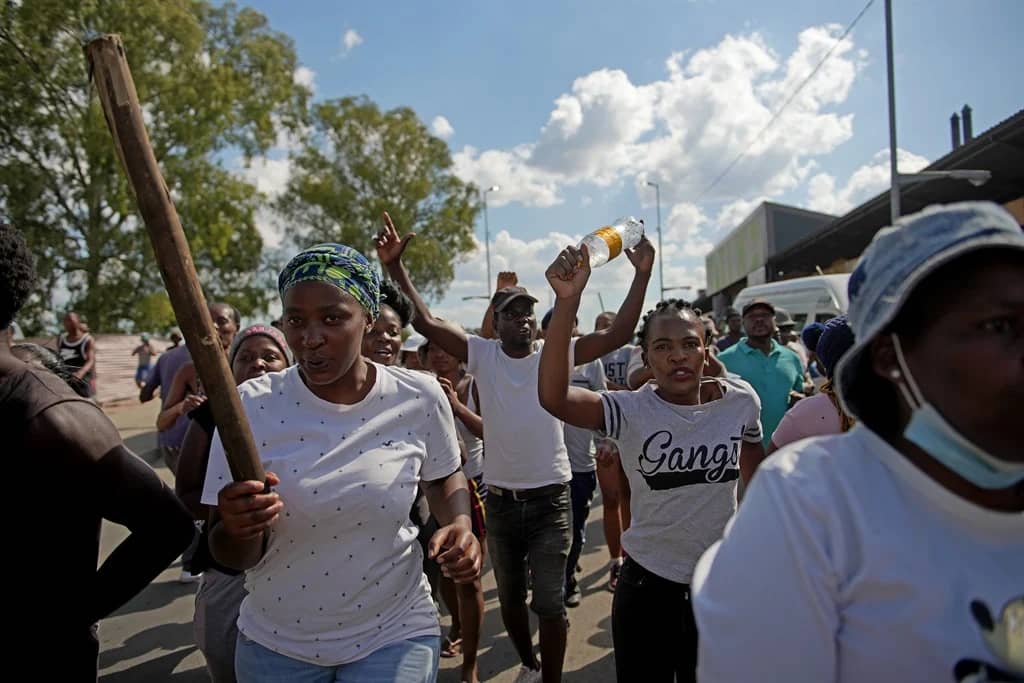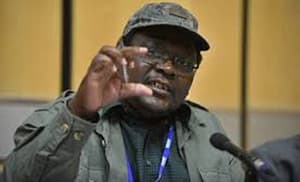Xenophobia: Isolate vigilante groups

Government needs to step it up a gear amid fears of xenophobic agitation gaining traction nationally.
Government needs to strengthen law enforcement and buttress community policing forums and other structures in order to “isolate” vigilante groups that are taking advantage of the increase in crime in the country to fuel sentiment against foreign nationals.
This is according to Deputy State Security Minister Zizi Kodwa, who spoke yesterday as fears spread that the violence that swept through the Johannesburg township of Diepsloot this week could escalate in Gauteng and fan similar incidents in other parts of the country.
Violence in Diepsloot erupted after a spike in crimes – including murders – that locals have blamed on foreign nationals. As residents went door-to-door demanding proof of South African citizenship or legal residency, Zimbabwean immigrant Elvis Nyathi was brutally killed by a mob, who beat him with an assortment of objects and then set him alight.
Kodwa told City Press that the spike in crime was central to the latest flare up of anti-immigrant sentiments. He said government had identified “border management and control, immigration policy, crime, lack of service delivery and unemployment as the triggers that need urgent attention by the country’s leadership”.
He said:Dealing with crime is important regardless of the nationality of a perpetrator. This will help to isolate the vigilante groups that undermine rule of law, social stability and citizens’ rights
He said government must also strengthen its border management and review its immigration policy.
“The role of state security is to identify the threats and risks to social stability and actions that could lead to the undermining of the rule of law, social instability and constitutional disorder.”
A senior bureaucrat in the security cluster said that the Operation Dudula movement, led by Nhlanhla “Lux” Mohlauli, had been allowed to get out of hand and the country’s security apparatus should have dealt with it by now.
The official said the movement’s influence was evident in other incidents of unrest across the country, but it had lost control of the situation.
“It’s no longer the Dudula group running the show now, but it is clear that incidents still have Dudula influence. You might zoom into Dudula leader, but it is out of his control now. Even if you arrest him and charge him now, it would not assist.”
The source said the security forces should put together a task team to hunt down the perpetrators, “otherwise this thing will get out of hand”.
The senior operative blamed the department of home affairs for having “dropped the ball” in keeping a lid on the foreign nationals being corruptly naturalised. The operative also blames the police’s crime intelligence division for being caught flat-footed.

The source said:Crime intelligence was supposed to be ahead [of the curve] and penetrate these groups. Even the State Security [Agency] should be in that space. It’s bad. We are nowhere to be found.
Another intelligence official said it was now up to President Cyril Ramaphosa to provide political leadership by instructing new national police commissioner Fannie Masemola to prioritise the escalating situation.
GOVERNMENT RESPONDS AFTER VIOLENCE
Police Minister Bheki Cele, Home Affairs Minister Aaron Motsoaledi and Masemola engaged with Diepsloot residents at the local youth centre on Friday.
According to the SA Police Service (SAPS), a search was under way for the suspects who used this week’s protests “as a cover for criminality” and killed Nyathi.
The SAPS statement read:Police were patrolling the area on Wednesday evening when they came across the incident where the suspects attacked the deceased and set him alight. It is reported that prior to the incident, the group had been moving from house to house claiming to be searching for criminals and demanding either passports or money. The suspects evaded arrest after fleeing the scene.
On Friday, government announced several measures to immediately address the concerns of residents.
Cele said that an additional 16 police vehicles were deployed to the township to improve police visibility, while Motsoaledi said 25 officials from the department of home affairs would be based in Diepsloot.
He added that the officials would in the area for three months to deal with immigration issues.
RAMAPHOSA SLAMS ‘APARTHEIDWAY OF DOING THINGS’
Speaking during his presidential imbizo in the Free State this weekend, Ramaphosa said he deplored “any action that is taken against anyone to the extent that they are killed”.
He said:We should not take the law into our own hands and we should not be targeting anyone the way people from other countries have been targeted. As South Africans, we should always be respectful to people from other nations and whatever challenges we have, we should use the law enforcement channels.
Ramaphosa said it was unacceptable that people were woken up in the middle of the night and asked to produce IDs to prove they were South African.
“The country cannot accept behaviour like that where people are hunted down that way and are asked questions about their own identity, because it takes us back to the apartheid way of doing things. We are in a democracy and we should be very restrained and respectful of the rights of people.”
NYATHI ‘GOT ALONG’ WITH NEIGHBOURS
When City Press visited the one-roomed shack Nyathi shared with his wife Nomsa Tshuma, gory blood stains were still visible on the walls and on the white lace curtain separating the bedroom from the lounge. Blood spatter at the entrance. Photo: Palesa Dlamini/City Press
Blood spatter at the entrance. Photo: Palesa Dlamini/City Press
“This is what they did to my brother,” said Nyathi’s younger brother, Mzayifani Nyathi (35), sombrely.
He gestured to the blood stains on the wall.
The family was still in deep shock after witnessing the brutal attack and killing of the father of four, who, according to Mzayifani, worked as a gardener and did various piece jobs.
Mzayifani said: “It has been and is still so painful because I never thought that this would happen to him, more so because of the loving and generous person that he was.
“And because of how well he got along with his neighbours and people in the area.
“The people here in Extension One knew who he was and what kind of person he was.”
Having moved to South Africa in 2001, for about three years Nyathi “was unable to get a job” and he went back to Zimbabwe in 2004.
However, he returned to South Africa in 2012 and had been in the country since.
“He used that little money he earned from gardening piece jobs to support himself and his wife, as well as his children.”
With a slight smile, the younger man recalled his brother’s humble beginnings:I am actually the one who assisted him with getting into that space because when he returned in 2012, I had started working on people’s gardens and we then began working in the same space.
However, the younger Nyathi later found employment as an Uber Eats driver, which is what he was doing on that fateful night when he received the devastating call about Elvis’ murder.
“I was at work in Melrose Arch at the time. I then drove back to Diepsloot. When I arrived, I found him about a street away from his house, burnt to the ground,” he recalled.
Mzayifani said although they are foreign nationals, the family wants justice: “We are here in South Africa, but it is not by choice. We come here because of the unbearable situation back home. All he wanted to do was be able to provide for his family the best he could.
“We understand the anger of South Africans sometimes, but we wish it didn’t have to escalate to this level. Not every foreign national is a criminal.”
ELVIS NYATHI’S LAST BREATHS
Relaying what happened to his younger brother on that fateful night, Nyathi’s older brother, 48-year-old Godknows Nyathi, told City Press about how his sister-in-law and brother had attempted to hide from a mob that was conducting door-to-door raids in the area.
“My sister-in-law told us that a crowd had been insisting that people show their documents allowing them to be in the country.
“And of course with a loud crowd, as well as the fact that we live in shacks assembled using corrugated iron, it was easy for them to hear what was happening before the crowd got to their shack.”
Godknows says Tshuma told him that the couple ran and hid elsewhere, but unfortunately, “a man who was being chased by the mob or part of the mob ran to the area where my brother and his wife were hiding, and so they were discovered”.
He explained:My brother then started running away, and the mob ran after him saying the reason he was running was because he had a gun, and they accused him of being a criminal. They caught up with him, beat him up and dragged him, insisting he take them to where he had allegedly hidden his gun in his shack.
Nyathi pleaded innocence, but his cries fell on deaf ears.
Godknows told City Press how his brother was subsequently dragged home, where “the mob raided his shack in search of the supposed gun, turning everything upside down while demanding money from them both. Money they did not have. When they did not find a gun – because it does not exist – they decided to take his wife’s passport.”
Godknows told how his brother was then dragged out of his shack to the next street, where he was beaten again and set alight, and then “left to burn like he was nothing”.
Echoing his brother Mzayifani’s sentiment, Godknows, who has been in the country for more than 20 years, said what had left the family in shock over and above “how he was killed” was that “he is someone who did absolutely nothing wrong”.
–City Press







